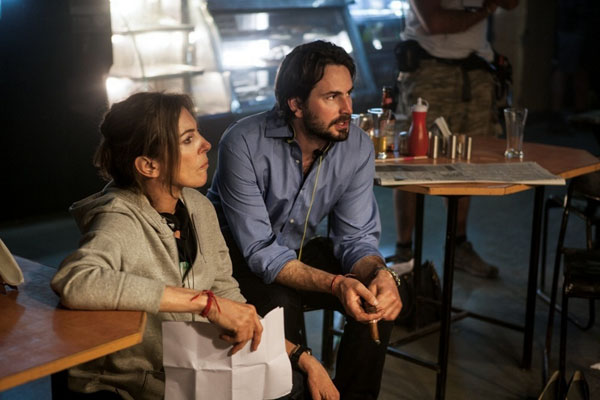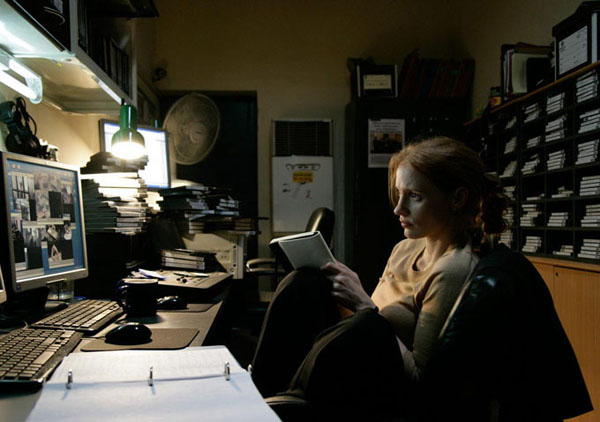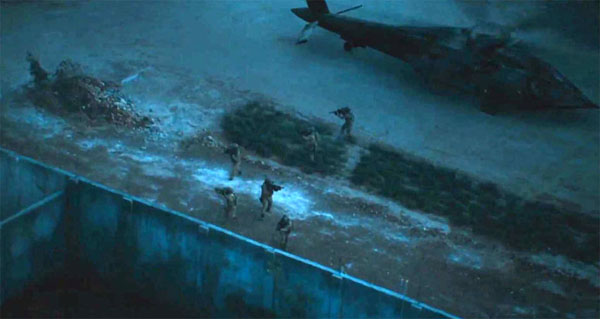Since the Zero Dark Thirty memos are flying fast this week, I’ve got one for Gawker‘s Adrian Chen. Calling Kathryn Bigelow’s 2012 film a “revenge-porn flick” and “the biggest publicity coup for the CIA this century outside of the actual killing of Osama bin Laden”—right at the top of your lede, no less—won’t inspire much faith in your credibility. That said, congrats on the scoop. My own initial reaction was similar to that of one MsxHill, who comments, “When Glenn Greenwald began criticizing this movie, I ignored him…. Now I feel like a chump.” On second thought, I’m not so sure. Other commenters, such as tektwo, are countering that because screenwriter Mark Boal was investigating a CIA operation, it’s only natural that he’d consult the CIA. The question is: Did the CIA bend the truth, and did Boal, in turn, bend to the Agency?
Let’s back up. As the Guardian‘s Ben Child notes in his piece on the Gawker story, “In January the US Senate intelligence committee launched an investigation into whether Bigelow and screenwriter Mark Boal were granted ‘inappropriate access’ to classified CIA material following concern from high-profile members over the film’s depiction of torture in the search for the al-Qaida chief. The probe was dropped in February after Zero Dark Thirty, which had initially been tipped as an Oscars frontrunner, left the world’s most famous film ceremony with just a single award for sound editing. However, according to Gawker, it has now emerged that the CIA did successfully pressure Boal to remove certain scenes from the Zero Dark Thirty script, some of which might have cast the agency in a negative light.”
As Chen notes, an avalanche of CIA documents on ZDT were released last year well before the Senate committee’s investigation, but the memo Gawker‘s obtained, “summarizing five conference calls between Boal and the CIA’s Office of Public Affairs in late 2011,” was released just last month. “During these calls, Boal ‘verbally shared the screenplay’ for Zero Dark Thirty in order to get the CIA’s feedback, and the CIA’s public affairs department verbally asked Boal to take out parts that they objected to. According to the memo, he did.”
Most of the changes outlined in the memo, even if they’re not to be dismissed entirely, are relatively insubstantial. One, however, is not. In an early draft, Boal evidently had Maya, a composite character based on two CIA officers actually named in the memo and played in ZDT by Jessica Chastain, participating in the enhanced interrogation, i.e., torture of “a character who is modeled after Ammar al-Baluchi” in the long and hotly debated opening sequence. The CIA “emphasized” to Boal “that substantive debriefers did not administer EITs” because there would have been “a non-interrogator, substantive debriefer assisting in a dosing technique.” Can’t argue with Chen on one point: “The decision to have Maya abstain from the torture was as significant artistically as it was factually.” Maya’s abstention is indeed so essential to her character that it’s difficult to even fathom that Boal initially had her emptying a bucket of water onto the face of the bound prisoner.
Thing is. Even if Maya had taken an active role in the torture (as it is, she’s a passive participant), her involvement would not alter a crucial element of the plot, one that may or may not be interpreted as Boal and Bigelow’s commentary on the efficacy of torture. The key piece of information that leads the CIA to the courier, leading them in turn to the compound where bin Laden is hiding, is not obtained through torture. To my mind, Ignatiy Vishnevetsky‘s review of ZDT for the Notebook in December remains one of the best pieces yet written on the film, and there’s an intriguing few minutes in Ignatiy’s conversation with Peter Labuza in March in which he discusses a passage he worked over several times before deciding it’d have no place in the final review. That passage focuses on the files in Maya’s office, and what Ignatiy’s noticed is that they’re the same set of files, seemingly untouched, in scene after scene, even as the years within the world of the film roll on by. It’s as if Bigelow, by including the stagnant set of files within the frames of shots for scenes set during progressive stages of the investigation, were emphasizing the stagnation of the pursuit. All the while, the decisive clue is hidden in plain sight, right there in Maya’s office.
There will be no final word on whether Zero Dark Thirty tells the truth, the whole truth, and nothing but the truth about the hunt for Osama bin Laden and the CIA’s role in its eventual success. Even if the CIA were to bust the vaults wide open on those years, which I seriously doubt will happen in my lifetime at least, we’re still stuck with the basic fact that ZDT is not a documentary. The account has been fictionalized, beginning right off the top with the character of Maya—again, a composite.
I opened the Daily roundup on ZDT over this past Thanksgiving weekend and stopped updating it in mid-December, just as the political debates were really catching fire (and “debates” is intentionally plural here; whether you believe ZDT is pro-torture, anti-, or even neutral on the question, your stand doesn’t necessarily mandate your position on whether or not ZDT is CIA propaganda—or vice versa, and so on). As I told Girish Shambu in a comment on that entry, I’ve been intending to pull together a second roundup ever since. Well, even the DVD/Blu-ray release date has come and gone, so: In addition to Girish‘s essential links, let me simply add a few more, most of them having to do with another sort of debate altogether: ZDT as a film as opposed to some sort of political tract:
Michael Atkinson (Sight & Sound and Sundance Now), Richard Brody (New Yorker), Richard Combs (Film Comment), Mike D’Angelo (AV Club), Joseph Jon Lanthier (Idiom), Jeff Reichert (Reverse Shot), Michael Sicinski (Nashville Scene), and Michael Wood (London Review of Books).
Plus, a bit more on the politics, too: Aaron Bady (New Inquiry), Mark Bowden (Atlantic), Steve Coll (New York Review of Books), Alex Gibney (Salon), J. Hoberman (Guardian), Nate Jones (Foreign Policy), and Matt Taibbi (Rolling Stone).
For news and tips throughout the day every day, follow @KeyframeDaily on Twitter and/or the RSS feed. Get Keyframe Daily in your inbox by signing in at fandor.com/daily.






